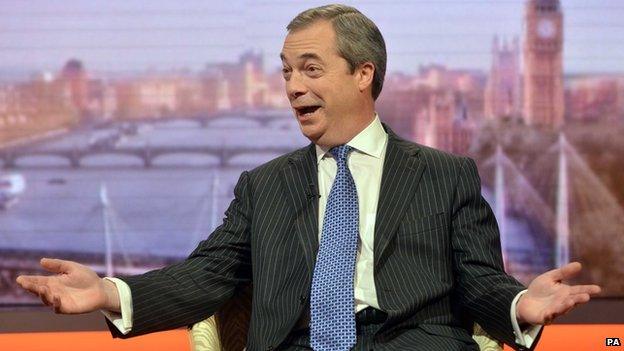Election profile: UK Independence Party
- Published

Party leader Nigel Farage
The UK Independence Party has seen its profile rise dramatically since the last general election, seizing two parliamentary seats in by-elections and coming top in the 2014 European elections.
UKIP formed in 1993, but in its early days was overshadowed by the well-financed Referendum Party, led by Sir James Goldsmith, which was wound up soon after the 1997 election.
Since then it has made gains at successive European elections, winning its first three seats in 1999 and going on to become the UK's biggest party at the European Parliament in 2014.
The party has, as its name implies, one key policy - to leave the European Union.
By-election wins
But it is also a message which meant people often dismissed it as a single-issue party, unlikely to transfer its success to Westminster politics.
It has made an effort to broaden its appeal, championing a British exit from the EU as the answer to a whole range of issues, notably controlling immigration.
They have also outlined plans to cut taxes for middle earners, defended grammar schools, opposed gay marriage and criticised wind turbines.
Before last year, it had only ever had one MP: Bob Spink, who briefly sat as a UKIP MP after a row with his local Conservative Party.
But all that changed when Conservative MP Douglas Carswell defected in August 2014 and stood down, triggering a by-election in his Clacton constituency which he won.
Later, Rochester and Strood MP Mark Reckless followed suit and was re-elected for UKIP in the same way.
Leader Nigel Farage and the party's other elected representatives have at times got into trouble for speaking their minds, which has helped bolster their image as an anti-establishment party.
The leader has sought to "professionalise" the party and pledged to be "utterly ruthless" in dealing with some of the party's candidates who, as he put it, "step over the line".
UKIP will be hoping to hold on to its two seats on 7 May and add to its tally to allow it to play a part in any power-sharing talks in the event of a hung-Parliament.
Mr Farage himself is running in South Thanet in Kent, and has said it will be "curtains" for him if he fails to get elected to Westminster.